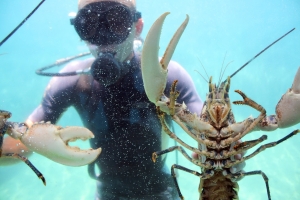Should NH allow scuba divers to catch lobsters?

The waters off the New Hampshire coast boast an abundant lobster population which has made the Granite State home to some of New England’s best seafood restaurants. For some, nothing says “summer” quite like a lobster roll. A bill before the New Hampshire Legislature would make it legal for scuba divers to catch lobsters recreationally by issuing a special license. However, some worry the legislation could have unintended consequences for the environment and the commercial lobster industry.
Lobstering in New Hampshire
There is a robust commercial fishing industry in New Hampshire, regulated by the state’s Fish and Game Marine Division. New Hampshire law includes strict rules about how and when lobsters can be caught; this is meant to keep the species from being depleted by overfishing. Of course, some residents wish to catch their own lobsters without running a commercial enterprise, and state law has a special provision for doing so. RSA 211:18 states that a resident who holds a recreational lobster and crab license may catch lobsters so long as they don’t use more than five lobster traps and don’t sell the lobsters.
About the bill
HB 1297 would allow New Hampshire’s Fish and Game department to issue a scuba diver recreational lobster license. This would mean that residents who wish to catch lobsters recreationally wouldn’t have to set lobster traps but instead could go scuba diving and catch the lobsters by hand. The bill establishes a “season” for taking lobsters from April 1 through September 15. Divers would be allowed to take at least three lobsters per day (Fish and Game could set the limit higher). Divers wouldn’t be allowed to sell the lobsters, and they could only be taken for their personal consumption, or for family and guests. Divers would also have to make sure the lobster was of legal size before surfacing with it.
This would be a five-year pilot program, after which time the Legislature could decide whether the benefits outweighed any downsides. More details about the specifics of the bill are available on the General Court’s website.
Expanding recreational lobstering
Rep. Gregory Hill (R-Northfield) believes New Hampshire should allow taking lobster while engaged in recreational scuba diving because he feels that current law fails to provide equal access to this natural resource. For one, setting lobster traps requires that a recreational lobsterman have a boat—you can’t just “throw the traps off the pier” as he puts it. Operating a boat, especially taking current gas prices into consideration, is very expensive. The required fishing gear also takes a lot of time to service. A diver, on the other hand, can go lobstering without having to trouble themselves with lobster traps. Instead, they can catch lobsters by reaching out and grabbing them.
Proponents also argue that divers who would choose to dive for lobsters off of New Hampshire’s seacoast would likely be a small, experienced group—they would understand the importance of avoiding areas where boats might be and know how to keep from getting entangled in fishing lines. Divers would likely focus on shallower waters and leave the deep water for the big lobster boats.
They also believe this small group of divers would have minimal impact on the lobster habitat and population.
Bad for commercial fishermen, bad for lobsters
Others who spoke at the House hearing for this bill warned of potential pitfalls. First, it could be challenging for the Fish and Game Department to enforce the law because they’d need to have divers in the water. Some worried that divers might steal lobsters from commercial lobster traps, or injure lobsters in an attempt to capture them. Lobster traps are specially designed to allow smaller lobsters to escape.
While Massachusetts and other states to our south do allow divers to catch lobsters, opponents of this bill pointed out that our coastline is much shorter than that of other states, which could mean divers and lobster fishermen could be competing for the same, relatively small territory.
The Fish and Game Department is also concerned about how scuba divers searching for lobsters could damage the nearshore habitat by flipping over rocks, disturbing roots of eelgrass, and so on.
What do you think?
This bill passed the House and recently had a public hearing in the Senate. If you think Granite Staters should be allowed to dive for lobsters, or if you think the law should remain as it is now, you can voice your opinion by contacting your state senator. You can find who represents you by selecting your town on our Elected Officials page.
Update: The Senate voted to kill HB 1297. Click here to explore the latest legislative proposals related to hunting and wildlife.











Comments
Login or register to post comments